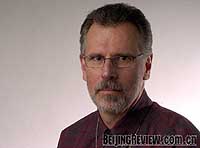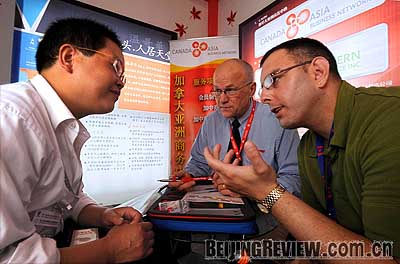|
 |
|
COURTESY OF FRED EDWARDS |
In 1998, then Chinese Premier Zhu Rongji referred to Canada as China's "best friend in the world." His statement reflected what many observers often described as a "special relationship" between the two countries, one that dated back to the mid-19th century.
During toasts at bilateral meetings, Chinese and Canadian officials were sure to mention Chinese immigration to Canada, Canadian missionary work in China, the sacrifice of Dr. Norman Bethune during the War of Resistance Against Japanese Aggression, the Canadian wheat sales that eased famine conditions in the early 1960s, Canadian Prime Minister Pierre Trudeau's decision to establish diplomatic relations in 1970, and the expanding economic relationship that developed in the 1990s.
 |
|
TALKING BUSINESS: A representative of the Canada Asia Business Network presents investment opportunities in Canada to a Chinese businessman at a consumer goods fair in Ningbo, Zhejiang Province, on July 9, 2008 (TAN JIN) | Today, however, no one would describe Canada and China as "best friends." The relationship is confusing at best, frosty at worst. What happened?
The short answer is the election of a Conservative government in Canada in January 2006. A longer and more complex explanation has to do with broad trends and conflicting priorities in Canadian foreign policy. The main conflict has been between an emphasis on autonomy and multilateral engagement on one hand, and a close identification with traditional allies and an emphasis on the promotion of what is often called "Canadian values" on the other.
Autonomy and multilateralism were priorities of Jean Chrétien, the Liberal Prime Minister who governed from 1993 to 2003. The free trade agreement signed with the United States in the late 1980s had led to a dramatic surge in cross-border trade to the point that more than 80 percent of Canadian exports were going to the American market by the mid-1990s. This intensification of the Canada-U.S. economic relationship raised concerns about the future of Canada's political independence, especially since the collapse of the Soviet Union and the end of the Cold War had created what some analysts referred to as a "unipolar" American-dominated world.
As a result, the Chrétien government sought to create some distance-even if only symbolically most of the time-from Washington. In 1994, Canada adopted a policy of active engagement with Beijing based on four pillars: peace and security; sustainable development; human rights and the rule of law; and economic partnership. Although each pillar was supposed to be equal, the economic dimension overshadowed the others, driven partly by the rapid growth of the Chinese economy during the 1990s. Chrétien twice led large "Team Canada" trade missions to China, and bilateral trade reached $17.5 billion by 2001, up almost 900 percent from 1989.
On the political front, Canada broke with the United States and ceased to support the annual resolution at the UN Commission on Human Rights criticizing China's human rights record, choosing instead to enter into a "human rights dialogue" with Beijing in 1997. Chrétien also publicly criticized what he called the Americans' "cowboy-style attitude" during the 2001 Hainan Island Incident. A U.S. military surveillance plane rammed into and destroyed a Chinese military aircraft over south China's Hainan Island on April 1, 2001.
Chrétien retired in 2003 but his successor, Paul Martin, continued to emphasize warm relations with China. In late 2005, he and Chinese President Hu Jintao announced a new "strategic partnership" between the two countries.
The Liberal Party's China policy was not without its critics. They felt Canada was subordinating human rights and democracy promotion to trade, and that the country was drifting too far from its traditional American ally. These ideas became part of the platform of the new federal Conservative Party that was founded in 2003. Stephen Harper, the party's leader, said, "There is now no more important foreign policy interest than maintaining the ability to exercise effective influence in Washington so as to advance unique Canadian policy objectives."
|
